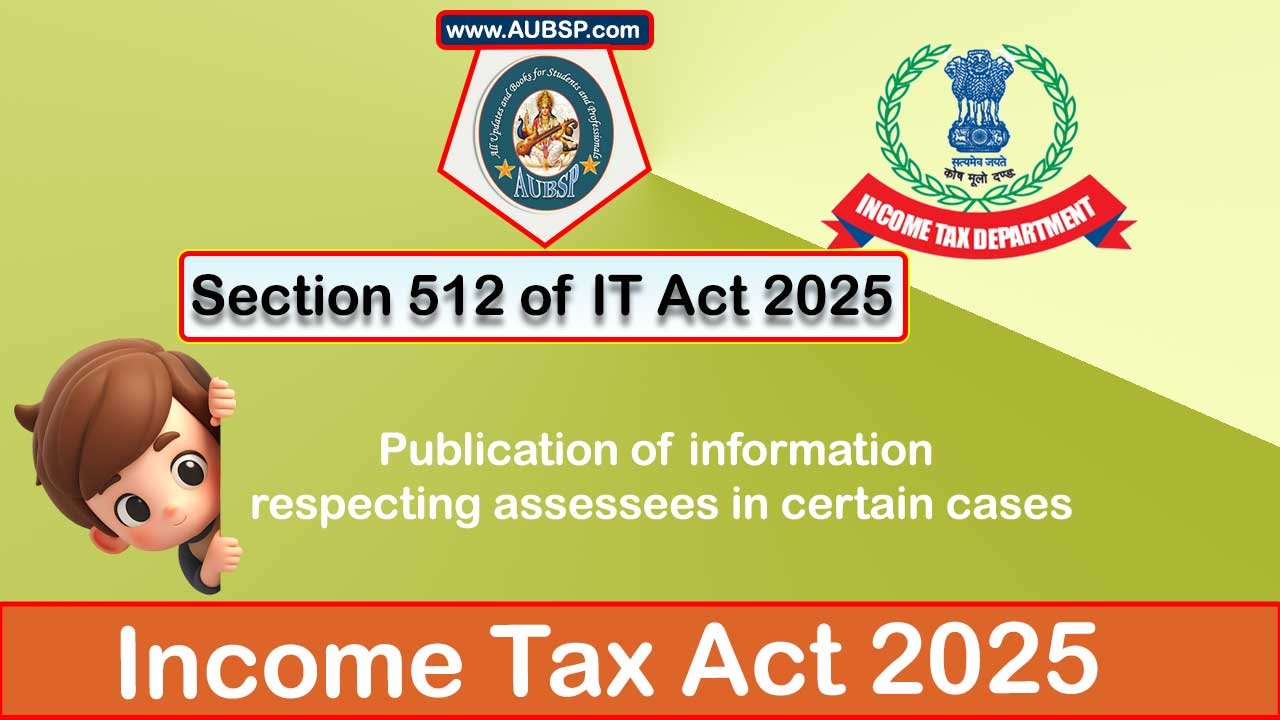Publication of information respecting assessees in certain cases
[As per the Income Tax Act, 2025 (this Act) w.e.f. 1st April, 2026.]
Section 512(1) of Income Tax Act 2025
512(1) If the Central Government is of the opinion that it is necessary or expedient in the public interest to publish the names of any assessees and any other particulars relating to any proceedings or prosecutions under this Act in respect of such assessees, it may publish such names and particulars in such manner as it thinks fit.
Section 512(2) of Income Tax Act 2025
512(2) No publication under this section shall be made for any penalty imposed under this Act, until the time for filing an appeal under section 356 or 357 has expired and no appeal has been filed, or if an appeal is filed, it has been disposed of.
Section 512(3) of Income Tax Act 2025
512(3) The names of the partners of the firm, directors, managing agents, secretaries and treasurers, or managers of the company, or the members of the association, as the case may be, may also be published under sub-section (1), if, in the opinion of the Central Government, the circumstances of the case justify it.
FAQs on Section 512 of Income Tax Act 2025
1. What does Section 512 of the Income Tax Act, 2025 deal with?
Section 512 empowers the Central Government to publish the names and other particulars of assessees involved in certain income tax proceedings or prosecutions if it considers it necessary or expedient in the public interest.
2. Who can authorize the publication of an assessee’s information?
Only the Central Government has the authority to decide and authorize such publication under Section 512.
3. What information can be published under Section 512?
The Government may publish:
- The names of the assessees.
- Other particulars relating to proceedings or prosecutions under the Income Tax Act.
4. Is publication allowed in all cases of penalty?
No, publication is restricted. No publication can be made in respect of penalties until:
- The time for filing an appeal under Sections 356 or 357 has expired and no appeal is filed, OR
- If an appeal is filed, it has been finally disposed of.
5. Can information be published if an appeal is pending?
No, information cannot be published if an appeal is pending against the penalty under Sections 356 or 357.
6. Can names of persons other than the assessee be published?
Yes, the following names may also be published if justified:
- Partners of a firm.
- Directors, managing agents, secretaries, treasurers, or managers of a company.
- Members of an association.
This can be done if the Central Government is of the opinion that the circumstances justify such publication.
7. What is meant by “public interest” in Section 512?
While the Act does not define “public interest”, it generally refers to situations where disclosure is necessary to:
- Protect the integrity of the tax system.
- Deter tax evasion.
- Promote voluntary compliance.
The Government has the discretion to determine this.
8. In what manner can such information be published?
The Act gives flexibility to the Government to publish the information “in such manner as it thinks fit”, which could include:
- Official gazette notifications.
- Press releases.
- Government websites.
- Public notices.
9. Is prior notice to the assessee required before publication?
Section 512 does not mandate giving prior notice to the assessee before publication, though procedural fairness may require it in practice.
10. Does Section 512 apply only to prosecutions?
No, it applies to both:
- Proceedings under the Income Tax Act.
- Prosecutions under the Income Tax Act.
11. Can the assessee challenge the publication?
Yes, if an assessee believes that the publication is unjustified or violates legal principles, they may challenge it through appropriate legal remedies, such as a writ petition before the courts.
12. From when is this provision effective?
This provision is effective from 1st April, 2026, as per the Income Tax Act, 2025.

